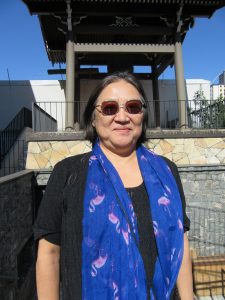
Hisako Mori is a second generation Japanese, or Nikkei, who was born in Brazil. Her parents emigrated from Japan to Brazil after World War II.
As a teenager, she felt a typical adolescent rebelliousness towards her mother. Then she met a Jodo Shinshu minister and began looking within herself, rather than outside herself.
“The reverend never scolded me for talking back to my parents,” she said. “Instead, he always spoke in terms of who we are as human beings. I think that’s the reason I encountered Buddhism as a path of self-reflection. By taking this path, I could examine my thoughts and feelings in my heart that were changing inside myself, rather than looking at life outside myself.”
Brazil abolished Christianity as the official state religion in 1889, but the religion still holds great influence in the country. About 90% of the population identify as Christians. In growing up and attending Brazilian schools, Ms. Mori learned about Christianity. However, her parents were devout Buddhists, so she was somewhat confused. “While I was in school, I often thought about the differences between Buddhism and Christianity.”
At age 29, she fell ill and began thinking about death and the meaning of life. During this time, she felt she walked a fine line between life and death. She began living with a sense of “obrigada,” the Portuguese word for “thank you.”
Later, she began learning papermaking and participating in exhibitions. She recognized a connection between papermaking and the Buddha dharma. In teaching her art to children, she emphasized how we should appreciate things we have and try not to waste anything, which is expressed by the Japanese word “mottainai” In this way, she felt children may appreciate the preciousness of life.
Encouraged by her family to deepen her understanding of Buddhism, she began attending the Higashi Honganji Betsuin temple in Sao Paulo.
“Buddhism is always with us,” she said. “But the moment we are consumed by our selfish thoughts—by this ‘self’—we lose sight of life. I learned the cause of suffering is this self, that’s why we need a mirror to see ourselves clearly. Buddhism provides this mirror. I want to continue learning throughout my life. I hope this important teaching spreads more widely in Brazil.”
Translated from Japanese. This story originally appeared in Higashi Honganji’s Dobo Shinbun, “Living Now, The World,” vol. 1, August, 2015

